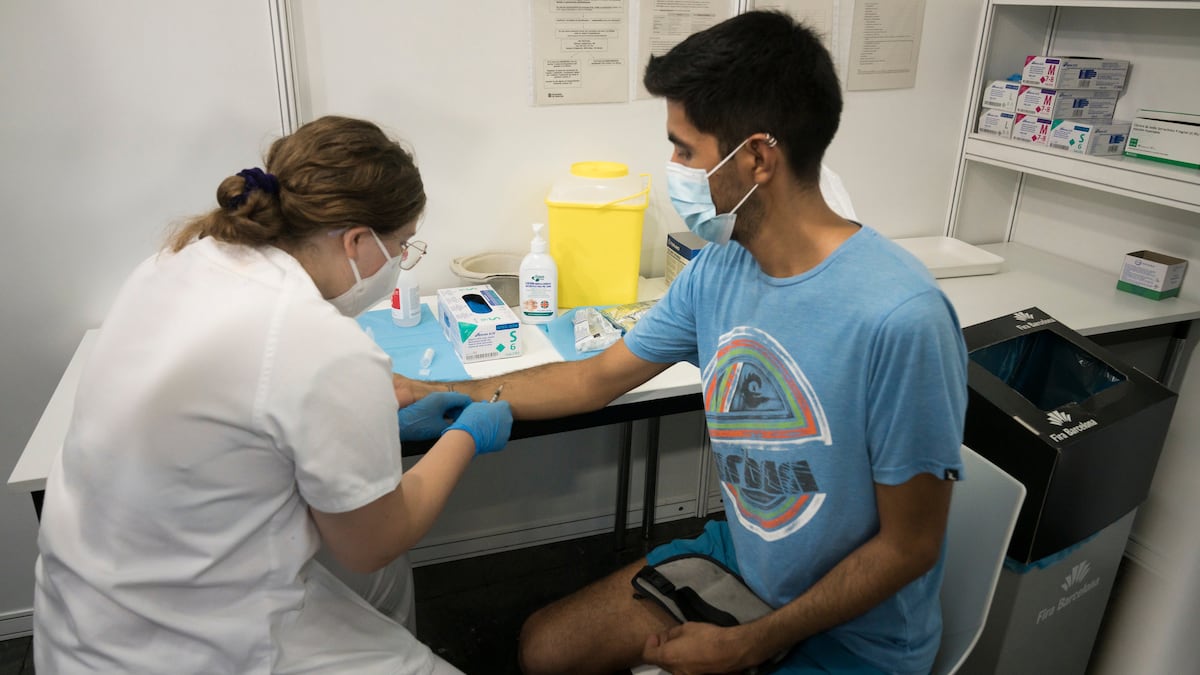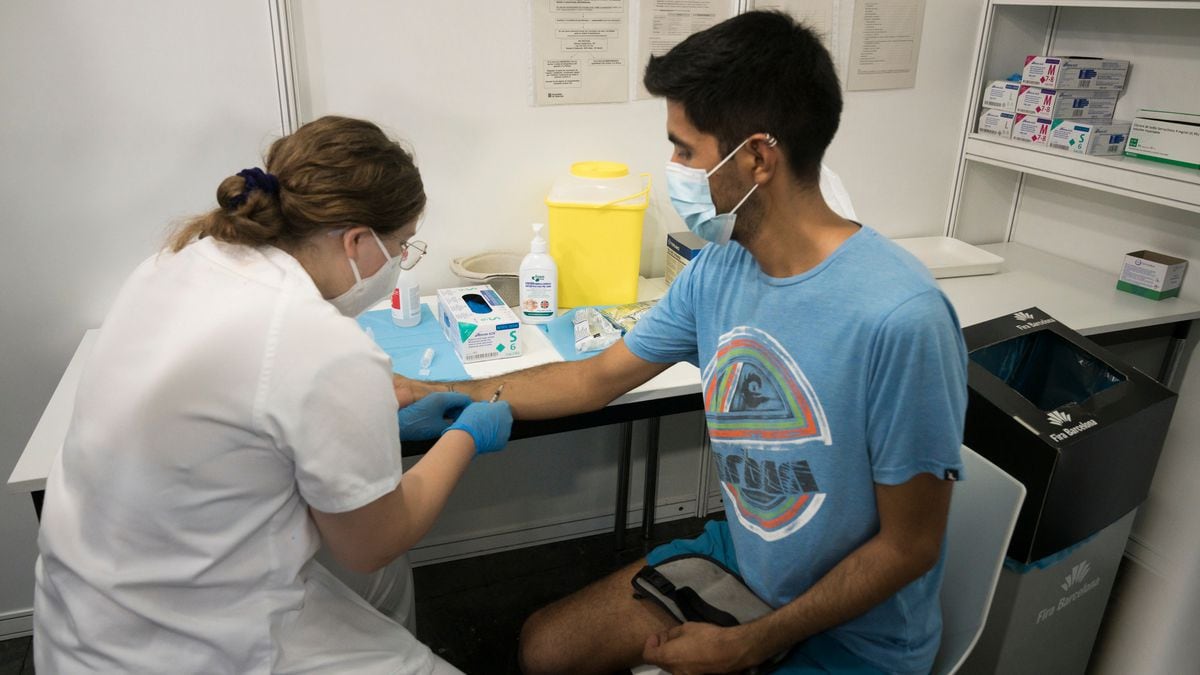
Europe has given up on eliminating monkeypox: ‘It will be just another STD’
The minutes of a meeting of the Advisory Forum of the European Centre for Disease Prevention and Control reveal how eradicating the virus was ruled out as being too costly and counterproductive
Europe has given up on eliminating monkeypox: ‘It will be just another STD’
The minutes of a meeting of the Advisory Forum of the European Centre for Disease Prevention and Control reveal how eradicating the virus was ruled out as being too costly and counterproductive

The vaccination campaign against monkeypox in Barcelona, Spain.GIANLUCA BATTISTA
ORIOL GÜELL
Barcelona - NOV 17, 2023 - 00:32 CET
At the beginning of this year, the global alarm caused by monkeypox in 2022 had practically vanished. Although the virus was still being closely monitored by public health services, and the World Health Organization (WHO) still considered it a health emergency of international importance (it did not declare the end until May), after 85,000 cases and 89 deaths worldwide, there were three causes for optimism. The first was that the number of new cases had been dropping for months, from the thousand a day reached in August to just a few dozen. The second was its low mortality rate, which was far from the initial forecasts that spoke about 10% of those infected. And finally, the certainty that the virus was inefficiently transmitted outside of the risk behaviors associated with group sexual relations, which ruled out an increase in cases among other population groups.
February was an important moment for decision-making regarding the first global outbreak of monkeypox (which was renamed mpox at the end of 2022). The WHO advocated for a global strategy to control and eliminate the disease, but the European countries had assumed just the opposite: that the virus was here to stay and that trying to get rid of it was not only going to be very difficult, but it would also be too costly and even counterproductive due to the need to apply strict public health measures, which could be met with some social opposition, as was the case at some point of the fight against Covid-19.
This information is revealed by the minutes of the meeting of the Advisory Forum of the European Centre for Disease Prevention and Control (ECDC), held at the organization’s headquarters in Stockholm, Sweden, on February 21 and 22 of this year. At the meeting, the Danish representative of the Forum stated that it was important to prepare for long-term work on this issue, because the underlying drivers of the outbreak had not disappeared, and there would be a new young, unvaccinated, sexually active cohort, so there could be a new outbreak. “For this reason, complete elimination might not be feasible. By continuing to vaccinate, test and advise the high-risk population, it will be possible to keep the outbreak under control, and monkeypox will be just another sexually transmitted disease.” The ECDC Advisory Forum, made up of officials from the organization and the different countries’ public health guardians, sets the guidelines of the European public health agency.
Mike Catchpole, ECDC chief scientist, added that the cost benefit argument for elimination did not appear to be compelling. This is a reflection of the dilemma that everyone present were facing: continue doing things as before or impose surveillance measures — with more or less force, with mandatoriness as a last resort — to identify suspected cases, carry out diagnostic tests, comply with quarantines and vaccinate the at-risk population. Measures that should be followed until the virus is eradicated from Europe, and then repeated every time an outbreak caused by an imported case occurs, something that is quite likely considering that the pathogen continues to circulate in other continents such as America and Africa.
The Slovenian representative, on her part, pointed out that as long as monkeypox is perceived as a non-serious disease, it will be very difficult to eliminate, and enforcing these measures will not be an easy task.
As for the vaccines — highly sought-after in the early stages of the epidemic — the representative of France wondered if there is still interest in them, because HERA (the health emergency preparedness and response department of the EU) had just delivered the second batch of vaccination, but there was little demand for it, unlike last July when there was a shortage. She agreed about not striving for elimination but asked whether countries were confident that they could procure vaccinations, undertake testing and have a long-term strategy for the disease.
The representative of the Netherlands shared the results of the models on the evolution of the disease that were developed in that country, which discourage the adoption of more drastic measures: “If the 0.7% of the population who were highly active became infected, a herd immunity threshold was achieved that actually caused the outbreak to wane, as had been observed last summer. Therefore, monkeypox appeared to be less infectious than had been assumed and the highest risk group would have already had the infection,” he emphasized.
However, this does not mean that future risks should be ruled out. “The outbreak,” he said, “highlighted the fact that this type of disease could be globally active if introduced into a certain group, and it is important to communicate this fact.” The problem, he continued, is that even in a country like the Netherlands, where there is little stigma around this group (men who have relations with multiple same-sex partners), this population segment is hard to reach.
The part of the meeting dedicated to mpox was closed by Vicky Lefevre, head of the Public Health Functions Unit of the ECDC, who stated that the agency would continue to cover ways to reach out and protect this group, in addition to monitoring, testing, raising awareness and offering the vaccination to high-risk groups. As a finishing remark, she mentioned that she was glad to hear that everyone appeared to be “in agreement on the elimination issue.”
The final stance of the ECDC was made official in a document published two months later describing in detail the recommendations to continue dealing with the mpox outbreak, which do not introduce any major changes to the strategy developed since the summer of 2022. Notably, the word “elimination” is not mentioned once in the 28 pages of the text.
“The meetings of the Advisory Forum are of a technical-scientific nature and all points of view are addressed with the aim of gathering, among all members, the best evidence available for decision-making. In this sense, the Forum would have failed in its functions and its mission if the difficulties involved in any initiative to eliminate a disease and the advisability or not of developing it had not been raised and discussed,” states a spokesperson for the Spanish Ministry of Health.
Carlos Maluquer de Motes, professor of molecular virology at the University of Surrey (UK) and expert in smallpox viruses, explains: “As a virologist, and taking into account that this virus is similar to that of [traditional] smallpox [already eradicated], I think it is always less risky to opt for a strategy of elimination instead of one of containment, which in the long run gives the pathogen time to continue adapting to humans and reach other population groups.”
However, he admits that there are other relevant factors that public health experts take into account in their decision-making. “The strategy that eradicated smallpox almost half a century ago included mandatory vaccination, something that is not in line with the current criteria, which are based on voluntary participation and face challenges such as anti-vaccine movements. This requires adapting the response in a way that takes into account the natural immunity of those who have already had the disease, which in this case is favored by the low mortality of mpox. In any case, allowing the virus to continue circulating requires close monitoring and considering measures to adapt the response, if necessary,” he continues.
In recent months, there has been a slight increase in mpox cases, something that the WHO and those responsible for public health already feared, given the proliferation of summer festivals in which risky practices are common. According to the latest WHO report, published on October 20 with data from late September, diagnosed cases exceeded 91,000 worldwide, with 157 deaths, most of them in the American continent. In Europe, 229 cases were diagnosed in September, seven times more than in August, although still far from the 2022 figures of several hundred a day.
Sign up for our weekly newsletter to get more English-language news coverage from EL PAÍS USA Edition
